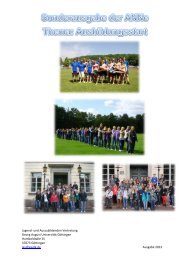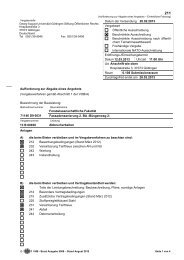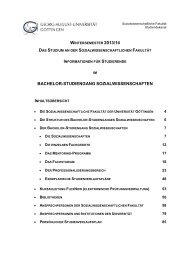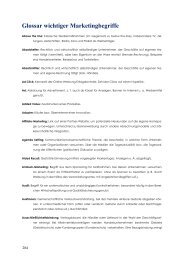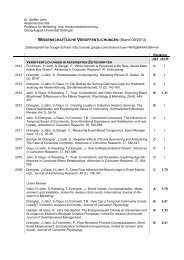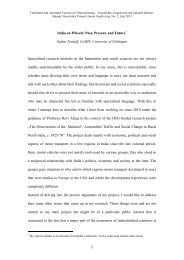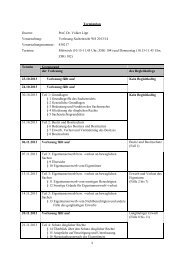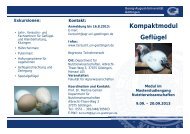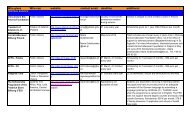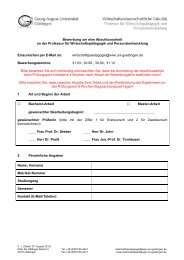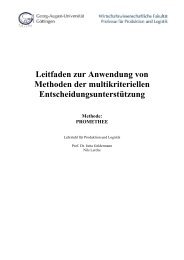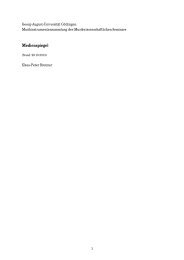CRC 990 - EFForTS - Georg-August-Universität Göttingen
CRC 990 - EFForTS - Georg-August-Universität Göttingen
CRC 990 - EFForTS - Georg-August-Universität Göttingen
You also want an ePaper? Increase the reach of your titles
YUMPU automatically turns print PDFs into web optimized ePapers that Google loves.
<strong>CRC</strong> <strong>990</strong> Ecological and Socioeconomic Functions of Tropical Lowland Rainforest Transformation Systems (Sumatra, Indonesia) Issue 1 / <strong>August</strong> 2013<br />
page 22 von 32<br />
V. Cooperation & Administration<br />
The Foreign Research Permit Team (FRP) of the Indonesian<br />
Ministry of Research and Technology (MENRISTEK),<br />
which is in charge for issuing research permits for foreigners<br />
doing research in Indonesia, has invited the <strong>CRC</strong><br />
<strong>990</strong> to present the progress of the project on May 01,<br />
2013. It has been one year ago since the first research<br />
permits for <strong>EFForTS</strong> researchers have been applied for.<br />
Main goal of the invitation was to see the involvement<br />
in and the benefit for the Indonesian side of the research<br />
collaboration <strong>EFForTS</strong>. Reports of research activities of<br />
<strong>CRC</strong> <strong>990</strong> and associated researchers have been handed<br />
over to the FRP team of MENRISTEK. In a presentation<br />
given by Dr. M. Agil the project development has been<br />
summarized:<br />
• Offices and field hubs have been established involving<br />
10 local staff taking care for approximately 150<br />
researchers involved, in total about 90 local assistants<br />
(mainly students or alumni from partner universities)<br />
have been hired by short term contracts to support<br />
field research activities.<br />
• For transportation in the field a vehicle park consisting<br />
of 3 cars and 22 motorbikes is available. Further, a<br />
central power generator for the laboratory at UNJA has<br />
been installed and additional complementary laboratory<br />
equipment has been purchased.<br />
• Laboratory cooperation between IPB, UNJA and UN-<br />
TAD as well as establishment of a herbarium at UNJA<br />
has been initiated.<br />
• Several scientific and technical trainings and guest lectures<br />
were given in Indonesia. Also, researchers from<br />
Indonesia visited the University of <strong>Göttingen</strong> for scientific<br />
exchange or training.<br />
• Almost 50 scientists from partner universities in Indonesia<br />
used the chance of start-up funding by the <strong>CRC</strong><br />
to develop their own complementary research ideas<br />
in the framework of the <strong>CRC</strong> <strong>990</strong>. Ten of these research<br />
initiatives successfully applied for national research<br />
funds.<br />
• For scientific data a joint database management procedure<br />
has been developed, a central database will be<br />
hosted on a mirror server at LIPI Data<br />
Centre. The planned joint database was<br />
highly valued by MENRISTEK seeing the<br />
<strong>CRC</strong> <strong>990</strong> as good practice project.<br />
The large size of the <strong>CRC</strong> <strong>990</strong> / <strong>EFForTS</strong> research collaboration<br />
and its broad range of research activities<br />
pose challenges for management and coordination by<br />
the Indonesian partners (Consortium). In addition to<br />
the quarterly reports the FRP advised the Indonesian<br />
<strong>CRC</strong> <strong>990</strong> / <strong>EFForTS</strong> consortium to hand in annual reports.<br />
Permit issues – general<br />
The large size of the research collaboration also poses a<br />
challenge for authorities involved in the permit process.<br />
Every single permit application has to pass a number<br />
of granting authorities. For the <strong>CRC</strong> <strong>990</strong> the International<br />
Cooperation Office (ICO) at IPB in Bogor is in charge<br />
for permits. It works closely together with national authorities.<br />
Most complex are export permits for biological<br />
material. In Indonesia the use and export of genetic<br />
material has become an issue of highest national importance.<br />
On May 08, 2013 the Nagoya Protocol on Access to<br />
Genetic Resources and the Fair and Equitable Sharing of<br />
Benefits Arising from their Utilization to the Convention<br />
on Biological Diversity came into force in Indonesia with<br />
Law No 11 / 2013. This law provides the legal basis for<br />
Indonesia to protect its genetic resources and to share<br />
benefits. This also affects scientific collaboration in the<br />
framework of the <strong>CRC</strong> <strong>990</strong> / <strong>EFForTS</strong>. The Nagoya Protocol<br />
(Article 8) differentiates between commercial and<br />
www.uni-goettingen.de/de/310995.html • crc<strong>990</strong>@gwdg.de • Telephone: +49 551 39-1 21 18<br />
JFB Institute for Zoology & Anthropology • Berliner Strasse 28 • D-37073 <strong>Göttingen</strong>




